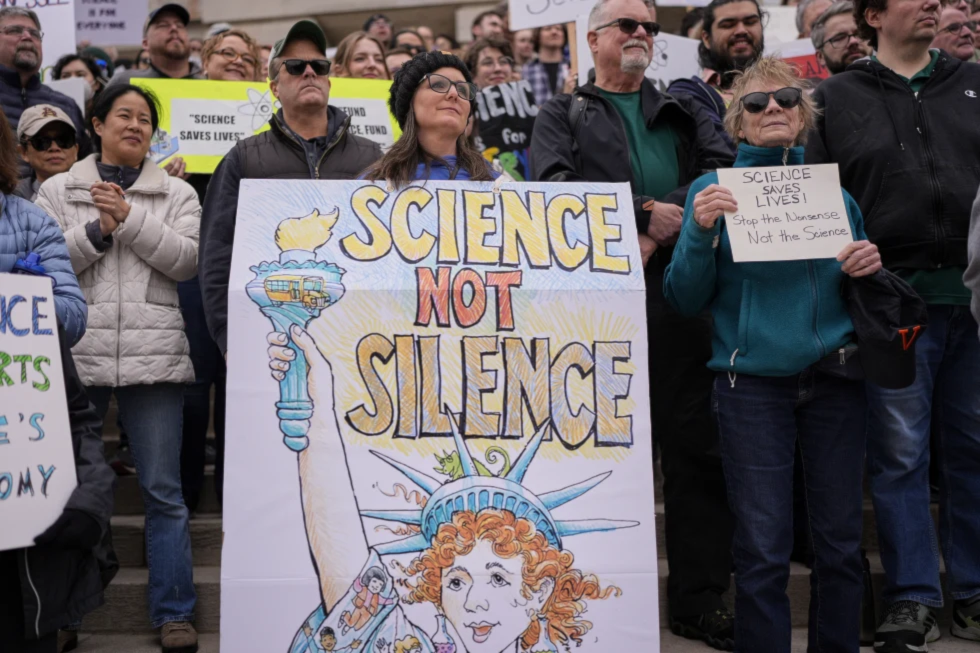Trump’s research cuts spark US job crisis
Research funding cuts under Trump have led to mass layoffs at the CDC, top universities, and R&D labs, with young scientists facing a job drought.
-

Jennifer Berry, center, wears a sign during a Stand up for Science rally Friday, March 7, 2025, in Nashville, Tenn. (AP/George Walker IV)
The United States is facing a growing scientific job crisis, as sweeping research funding cuts under US President Donald Trump are leaving thousands of scientists without work. Job openings in research and development are down 18% since Trump took office, far outpacing the national drop of just 4% in public and private sector vacancies, according to a new report by Indeed Hiring Lab.
From federal agencies to elite universities and private contractors, the cuts are reshaping career prospects for scientists across the country. The Centers for Disease Control and Prevention (CDC), the National Institutes of Health, and top universities like Columbia and Harvard are among those hit hardest. The impact is also being felt across the private sector, particularly in biotech and pharmaceutical firms that rely on government-backed grants.
The sudden contraction in science jobs has flooded the labor market with experienced professionals, putting pressure on early-career researchers. Ifunanya Dibiaezue, 32, earned her doctorate from the University of California, Berkeley, and has spent much of her career studying public health and contraceptive methods in Africa. Now, six months after graduating, she's still looking for a job.
“I don’t even know what to do,” she said. “It seems like you’re competing now with people who have so much experience.”
Traffic on the American Public Health Association’s job board has doubled, even as job listings decline, underscoring how difficult it has become for scientists to find stable employment.
Top universities and pharma firms scale back
The Trump administration has slashed billions in federal grants and contracts to top universities, including Harvard, Columbia, and Northwestern, citing what it perceives to be "antisemitism" and discrimination on campuses. Schools have responded by freezing hiring, terminating positions, or searching for alternative funding.
At Emory University, just blocks from the CDC’s Atlanta campus, the effects are immediate. Dean Daniele Fallin of the Rollins School of Public Health said many of the 550 graduating students are now shifting focus from federal roles to state agencies and consulting firms.
“They’re concerned about their job prospects, but also just the direction of the public health policy of the country right now,” Fallin said.
The CDC alone has cut 2,400 positions so far. Across the Department of Health and Human Services, 10,000 employees are expected to lose their jobs under plans unveiled by Secretary Robert F. Kennedy Jr. in March.
My full opening statement at the @HouseAppropsGOP budget hearing for @HHSgov: pic.twitter.com/dNnLixZDAa
— Secretary Kennedy (@SecKennedy) May 14, 2025
Job drought hits CDC, Emory, and young researchers
The private sector is also showing signs of retreat. The scientific R&D industry posted its largest job cut in over a year, while an industry survey found that 18% of early-stage biopharma companies are likely to pause major projects due to budget constraints.
German pharmaceutical giant Merck KGaA reported declining demand for drug research products in the US, citing policy uncertainty.
In academia, the fallout may worsen. According to Anna Airoldi of workforce intelligence firm Revelio Labs, the full impact will be visible later in the year as the academic hiring cycle reaches its peak.
As Trump’s administration continues its efforts to shrink the federal workforce, many fear a long-term brain drain and stalled scientific innovation. Economist Cory Stahle, who authored the Indeed report, summed it up, “They [science jobs] carry an outsize effect. They don’t just employ people, they fuel entire ecosystems.”

 4 Min Read
4 Min Read








